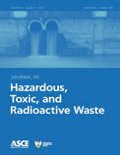
Journal of Hazardous Toxic and Radioactive Waste
Scope & Guideline
Uncovering insights for a cleaner, healthier future.
Introduction
Aims and Scopes
- Innovative Remediation Technologies:
Research on novel methods for the remediation of contaminated sites, including electrokinetic remediation, biosorption, and advanced oxidation processes to reduce hazardous waste. - Environmental Health Risk Assessments:
Studies assessing the health risks associated with exposure to hazardous materials, including heavy metals, pharmaceuticals, and radioactive substances, to inform public health policies. - Sustainable Waste Management Practices:
Exploration of sustainable practices for managing hazardous waste, including recycling, resource recovery, and minimizing landfill impacts. - Impact of Contaminants on Ecosystems:
Research examining the effects of hazardous waste on ecosystems, including aquatic and terrestrial environments, and strategies for mitigating these impacts. - Technological Innovations in Waste Treatment:
Development and evaluation of new technologies and materials for the treatment and disposal of hazardous waste, such as biochar, nanomaterials, and advanced filtration systems.
Trending and Emerging
- Nanotechnology in Waste Treatment:
Increasing research into the application of nanomaterials for the adsorption and degradation of pollutants, highlighting their efficiency and potential for innovative waste treatment solutions. - Integrated Waste Management Systems:
Emerging studies focus on holistic approaches that combine various waste management strategies, such as bioremediation, recycling, and energy recovery, to create sustainable systems. - Pharmaceutical and Personal Care Product Pollution:
A growing body of research addresses the environmental impact of pharmaceuticals and personal care products, focusing on their removal from wastewater and implications for public health. - Climate Change and Waste Management:
Research linking climate change impacts with waste management practices is emerging, emphasizing the need for adaptive strategies in the face of environmental challenges. - Circular Economy Models:
An increasing focus on circular economy principles within the context of hazardous waste, exploring ways to minimize waste generation and enhance resource recovery.
Declining or Waning
- Traditional Waste Disposal Methods:
Research on conventional landfill practices and incineration methods is becoming less frequent as attention shifts towards more innovative and sustainable waste management solutions. - Basic Chemical Treatment Processes:
Studies focusing solely on basic chemical treatment methods without integrating advanced technologies or sustainability considerations are declining in favor of more comprehensive approaches. - General Environmental Monitoring:
While environmental monitoring remains important, there is a decreasing emphasis on general monitoring studies without specific ties to remediation or health risk assessments.
Similar Journals

Waste Management
Leading the way in sustainable waste practices and research.Waste Management, published by Pergamon-Elsevier Science Ltd, stands as a premier journal in the field of waste management and disposal, reflecting its esteemed position with an impressive 2023 impact factor and ranking in the Q1 category. This journal is pivotal for researchers, professionals, and students, offering a rich repository of innovative studies and methodologies aimed at addressing the increasingly critical challenges in waste management. With a dedicated focus on advancing knowledge and practice in environmental science, it encompasses a wide array of topics from waste reduction techniques to sustainable disposal strategies. Founded in 1983, Waste Management continues to be at the forefront of academic discourse, providing invaluable insights into both theoretical frameworks and practical applications, thus playing a vital role in shaping the future of waste disposal practices worldwide.
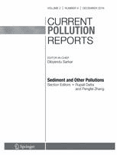
Current Pollution Reports
Advancing the Dialogue on Pollution SolutionsCurrent Pollution Reports, published by Springer Heidelberg, is an esteemed journal in the field of environmental science, focusing on the multifaceted aspects of pollution, waste management, and water science. With an impressive 2023 impact factor reflected in its status as a Q1 journal across multiple categories—including Management, Monitoring, Policy and Law, Pollution, Waste Management and Disposal, and Water Science and Technology—this journal stands at the forefront of environmental research and policy discourse. The journal, which has been in publication since 2015, aims to provide a platform for scholars and practitioners to share their findings, promoting the exchange of innovative ideas and effective solutions to pressing environmental challenges. With its rigorous peer-review process, Current Pollution Reports serves as an invaluable resource for researchers, professionals, and students committed to understanding and addressing pollution and its impacts on our planet.
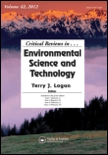
CRITICAL REVIEWS IN ENVIRONMENTAL SCIENCE AND TECHNOLOGY
Fostering Critical Discourse for a Greener TomorrowWelcome to CRITICAL REVIEWS IN ENVIRONMENTAL SCIENCE AND TECHNOLOGY, an esteemed journal published by Taylor & Francis Inc. This journal has been at the forefront of environmental research since its inception in 1993, spanning a wide range of disciplines including environmental engineering, pollution control, waste management, and water science. CRITICAL REVIEWS holds an impressive Q1 ranking in multiple categories, including Environmental Engineering and Pollution, demonstrating its critical role in advancing knowledge within the field. With a remarkable Scopus ranking—placing it in the top 1% for Environmental Science categories—this journal serves as an invaluable resource for researchers, professionals, and students alike, providing comprehensive reviews and analyses that catalyze innovative solutions to pressing environmental challenges. Though currently not open access, the journal's content is accessible through various academic platforms, ensuring that cutting-edge research is available to a global audience. Join the community of scholars dedicated to enhancing our understanding of environmental science and technology through rigorous investigation and critical discourse.
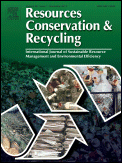
RESOURCES CONSERVATION AND RECYCLING
Transforming waste into resources through cutting-edge insights.RESOURCES CONSERVATION AND RECYCLING, published by Elsevier, is an esteemed journal that has been at the forefront of academic discourse since its inception in 1988. Focusing on the critical fields of resource management, recycling, and sustainability, this journal has established itself as a leading platform for innovative research, holding a prestigious position in the Q1 quartile for both Economics and Econometrics, and Waste Management and Disposal. With a remarkable Scopus ranking of #4 in its respective categories, it represents the pinnacle of scholarly contributions, aimed at fostering knowledge that drives efficient resource utilization and effective waste management practices. The journal's commitment to advancing the understanding of economic implications and environmental impacts of resource conservation is reflected in its diverse array of articles, case studies, and reviews. Although it is not an open-access journal, the valuable insights it offers are essential for researchers, professionals, and students who are dedicated to addressing pressing environmental challenges and enhancing sustainable practices on a global scale.
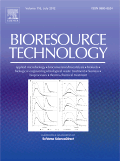
BIORESOURCE TECHNOLOGY
Transforming Challenges into Opportunities in Environmental EngineeringBioresource Technology, published by Elsevier Science Ltd, is a leading journal in the fields of bioengineering, environmental engineering, and sustainable resource management. With an impressive impact factor reflected in its Q1 rankings for 2023 across multiple relevant categories, it stands out as a premier source for groundbreaking research from its inception in 1991 to its anticipated contributions through 2024. Bioresource Technology promotes the advancement of technologies and methodologies aimed at the sustainable utilization of biological resources, playing a pivotal role in tackling the challenges of waste management, renewable energy, and environmental protection. Researchers and practitioners are encouraged to contribute and engage with high-quality studies that have significant implications for the global push towards sustainability and innovation. Although the journal does not currently offer Open Access, its subscription model ensures that the rigorous peer-reviewed content remains accessible to those dedicated to advancing the field.

WASTE MANAGEMENT & RESEARCH
Innovating waste management for a sustainable future.WASTE MANAGEMENT & RESEARCH, published by SAGE PUBLICATIONS LTD, is a premier journal dedicated to advancing the field of waste management and environmental concern. Established in 1983, this esteemed publication spans a comprehensive range of topics within Environmental Engineering, Pollution, and Waste Management and Disposal, with remarkable standings including a Q1 ranking in Environmental Engineering and a Q2 ranking in both Pollution and Waste Management and Disposal as of 2023. With an impressive Scopus ranking, placing it in the top percentiles of its categories, the journal serves as a vital resource for researchers, professionals, and students seeking to explore innovative solutions to waste management challenges. Although not an open access journal, its rigorous peer-review process ensures high-quality and novel research is made available to the academic community. Located in London, UK, WASTE MANAGEMENT & RESEARCH continues to be influential in shaping policies and practices that impact sustainable waste management practices worldwide.
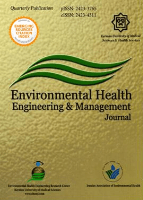
Environmental Health Engineering and Management Journal
Advancing the Nexus of Environment and HealthEnvironmental Health Engineering and Management Journal is a premier platform dedicated to the dissemination of research findings in the essential field of environmental health. Published by Kerman University of Medical Sciences in Iran, this Open Access journal has been a beacon of scientific inquiry since its inception in 2014. With an ISSN of 2423-3765 and E-ISSN 2423-4311, it facilitates broad accessibility to cutting-edge research that addresses the complex interactions between environmental factors and human health. With a notable categorization in the Q3 quartile for Environmental Science and Public Health, alongside Q4 in Chemical Health and Safety, the journal underscores its commitment to quality and relevance. Currently ranked #132 out of 233 in Environmental Science within Scopus, it serves as a crucial resource for researchers and practitioners striving to tackle contemporary environmental challenges. The journal's scope includes innovative methodologies, environmental risk assessment, and sustainable health practices, positioning it as an indispensable reference for those invested in improving public health outcomes through environmental engineering and management.

JOURNAL OF RADIOANALYTICAL AND NUCLEAR CHEMISTRY
Innovating the future of analytical chemistry and safety.JOURNAL OF RADIOANALYTICAL AND NUCLEAR CHEMISTRY, published by Springer, serves as a vital platform for the dissemination of research in the fields of analytical chemistry, nuclear science, and radiochemistry. With an ISSN of 0236-5731 and an E-ISSN of 1588-2780, this journal has been a beacon of innovation and scholarly communication since its inception, transitioning from converged years of 1977-1979 to its current continuity from 1984 to 2024. Positioned in the Q3 category for analytical chemistry and other related fields such as health, toxicology, and nuclear engineering, it boasts significant standings in the Scopus rankings, reflecting its relevance and impact within these disciplines. The journal emphasizes open access, encouraging broader accessibility to quality research, which is critical for students, professionals, and ongoing global scientific discussions. As a leader in its domain, the JOURNAL OF RADIOANALYTICAL AND NUCLEAR CHEMISTRY is committed to advancing the understanding of radioactive materials, environmental safety, and health applications, ensuring its readers remain at the forefront of emerging trends and discoveries.

International Journal of Environmental Science and Technology
Exploring innovative pathways in environmental science.International Journal of Environmental Science and Technology, published by SPRINGER, stands as a premier platform for the dissemination of cutting-edge research in the fields of environmental science, technology, and engineering. With an impressive scope spanning from 2005 to 2024, this journal serves as a vital resource for academic and professional communities engaged in tackling pressing environmental challenges. It boasts a strong reputation, evidenced by its Q1 ranking in Agricultural and Biological Sciences and solid placements in Environmental Chemistry and Engineering. Researchers searching for high-impact studies will find the journal's contributions significant, as reflected in its rankings within Scopus: 34th percentile in Agricultural and Biological Sciences and notable standings in Environmental Engineering and Chemistry. Although the journal is not currently an Open Access resource, it maintains a commitment to academic rigor and innovation, making it indispensable for those devoted to advancing knowledge in environmental sustainability and technology.
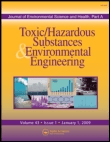
JOURNAL OF ENVIRONMENTAL SCIENCE AND HEALTH PART A-TOXIC/HAZARDOUS SUBSTANCES & ENVIRONMENTAL ENGINEERING
Exploring the impact of toxic substances on our world.JOURNAL OF ENVIRONMENTAL SCIENCE AND HEALTH PART A-TOXIC/HAZARDOUS SUBSTANCES & ENVIRONMENTAL ENGINEERING, published by TAYLOR & FRANCIS INC, stands at the forefront of research in the dynamic fields of environmental science and public health. With an ISSN of 1093-4529 and an E-ISSN of 1532-4117, this journal serves as a pivotal platform for disseminating significant findings regarding toxic substances and their impact on the environment and human health. It is categorized in the Q3 quartile for both Environmental Engineering and Medicine in 2023, showcasing its relevance within these disciplines. Researchers will find valuable insights in the 90th rank among 197 in the Environmental Science and Engineering category, placing it in the 54th percentile among its peers. While access options remain traditional rather than open-access, the journal is dedicated to serving as an essential resource for professionals and academics engaged in understanding the intricate connections between hazardous materials and environmental safety. The journal has consistently published critical research since its inception in 1978 and is committed to advancing knowledge up to 2024, making it a crucial venue for ongoing discussions and developments in environmental health.